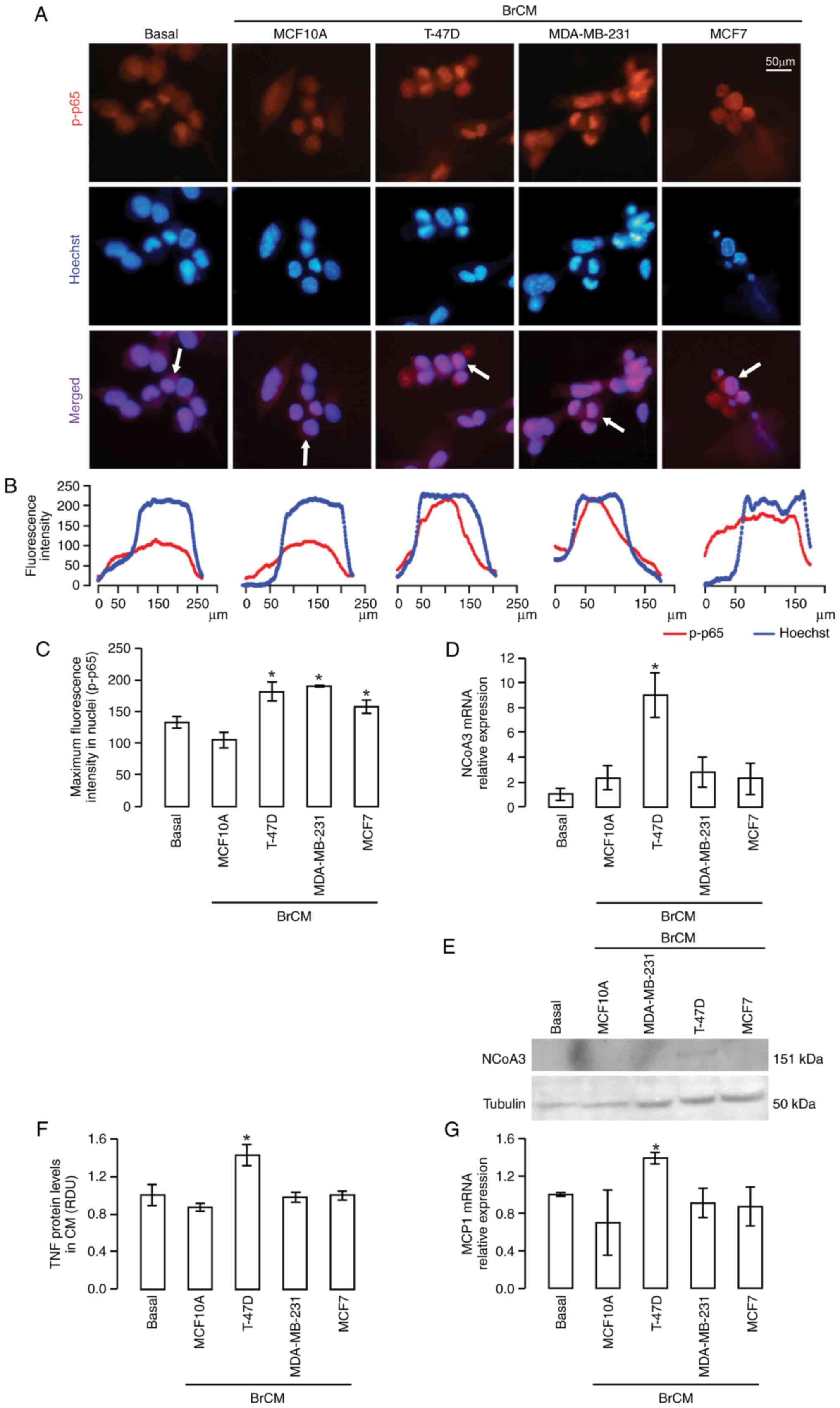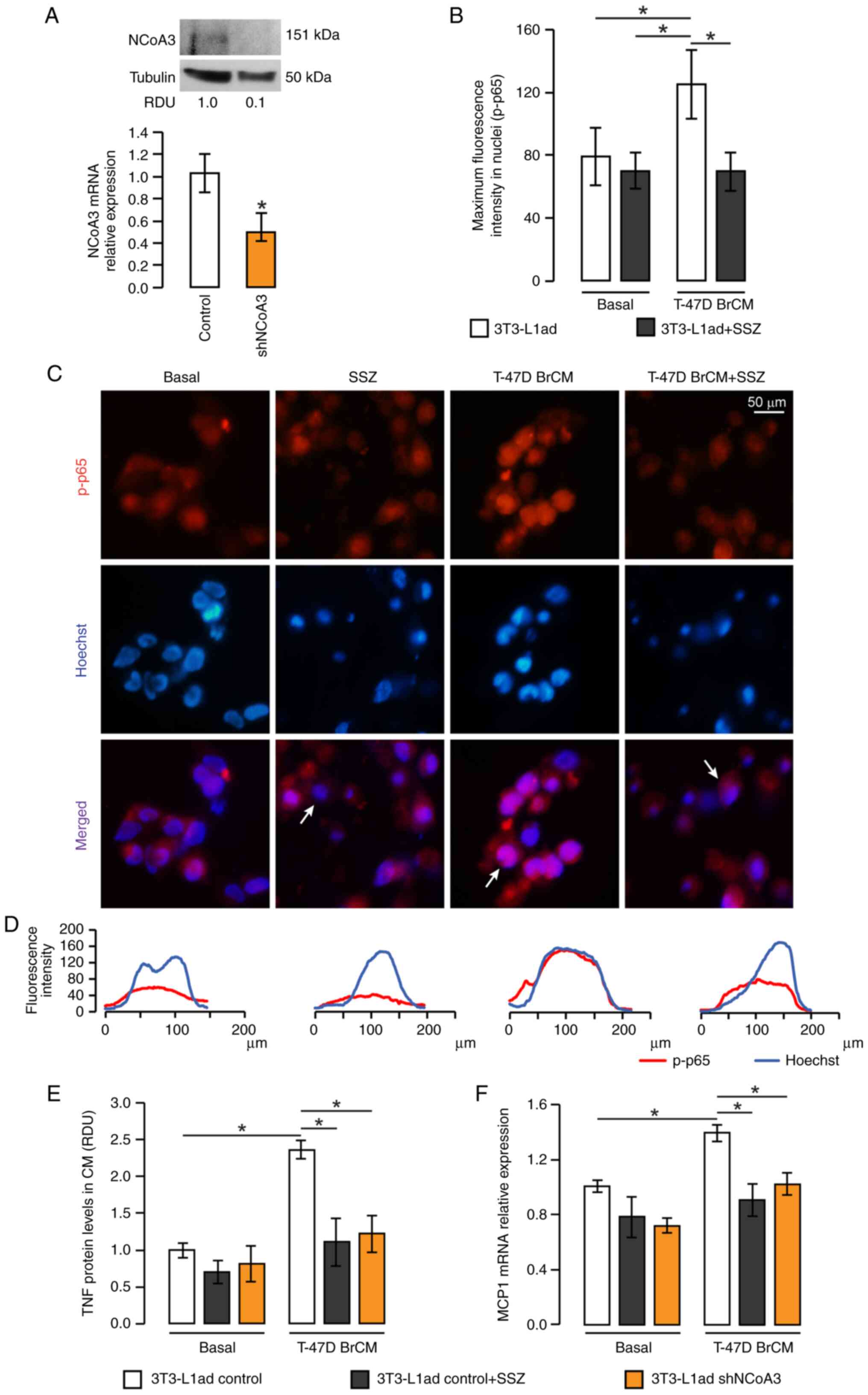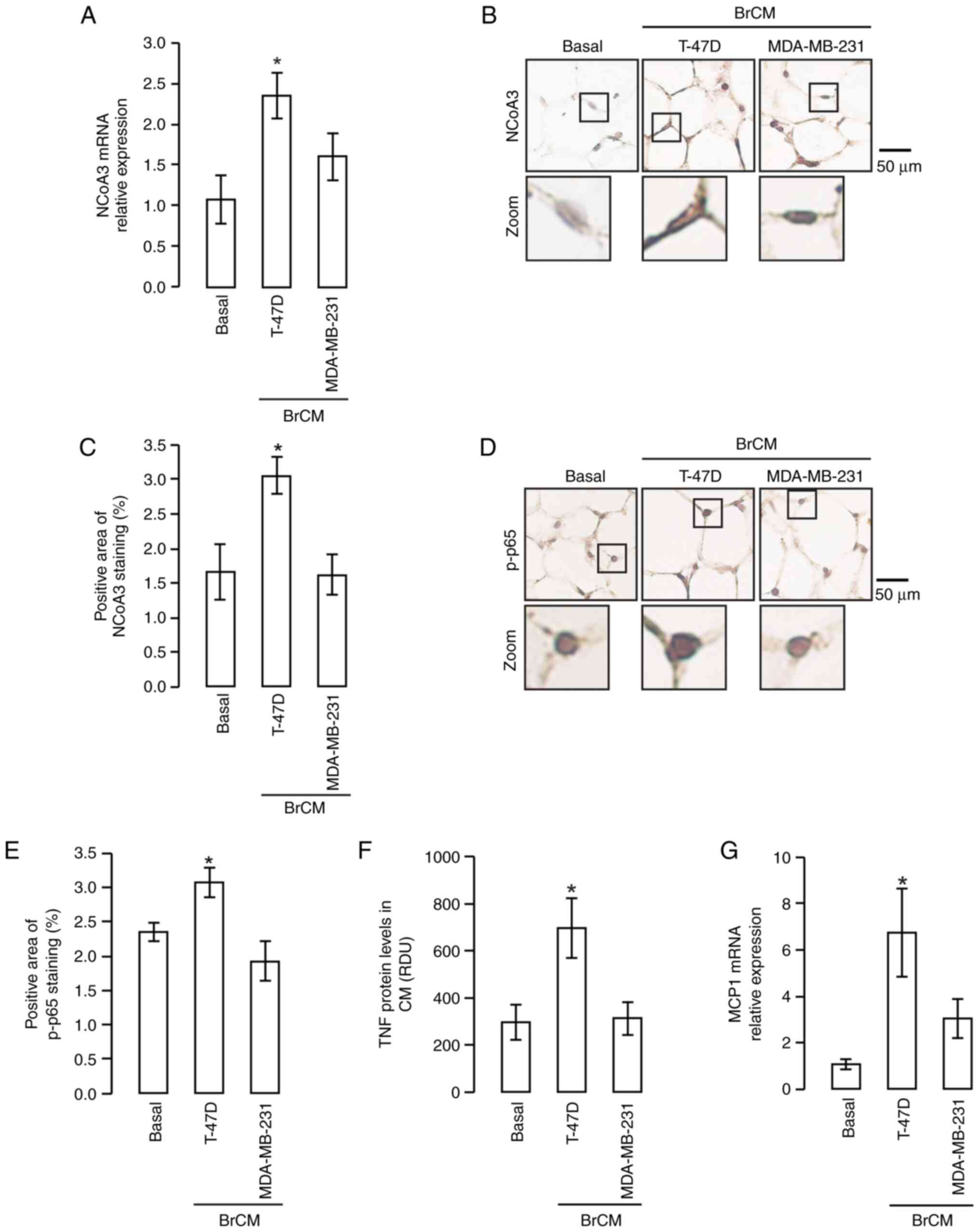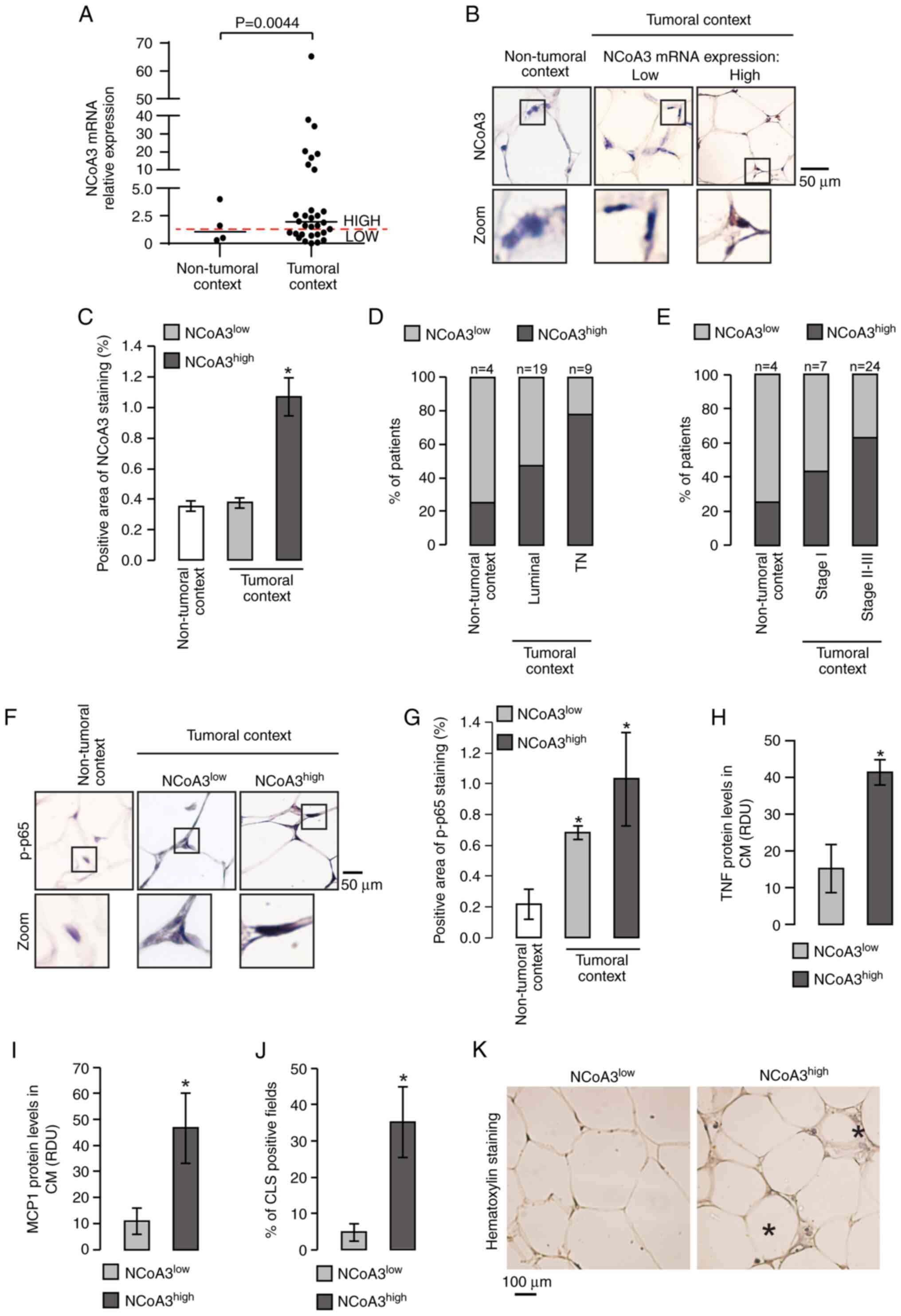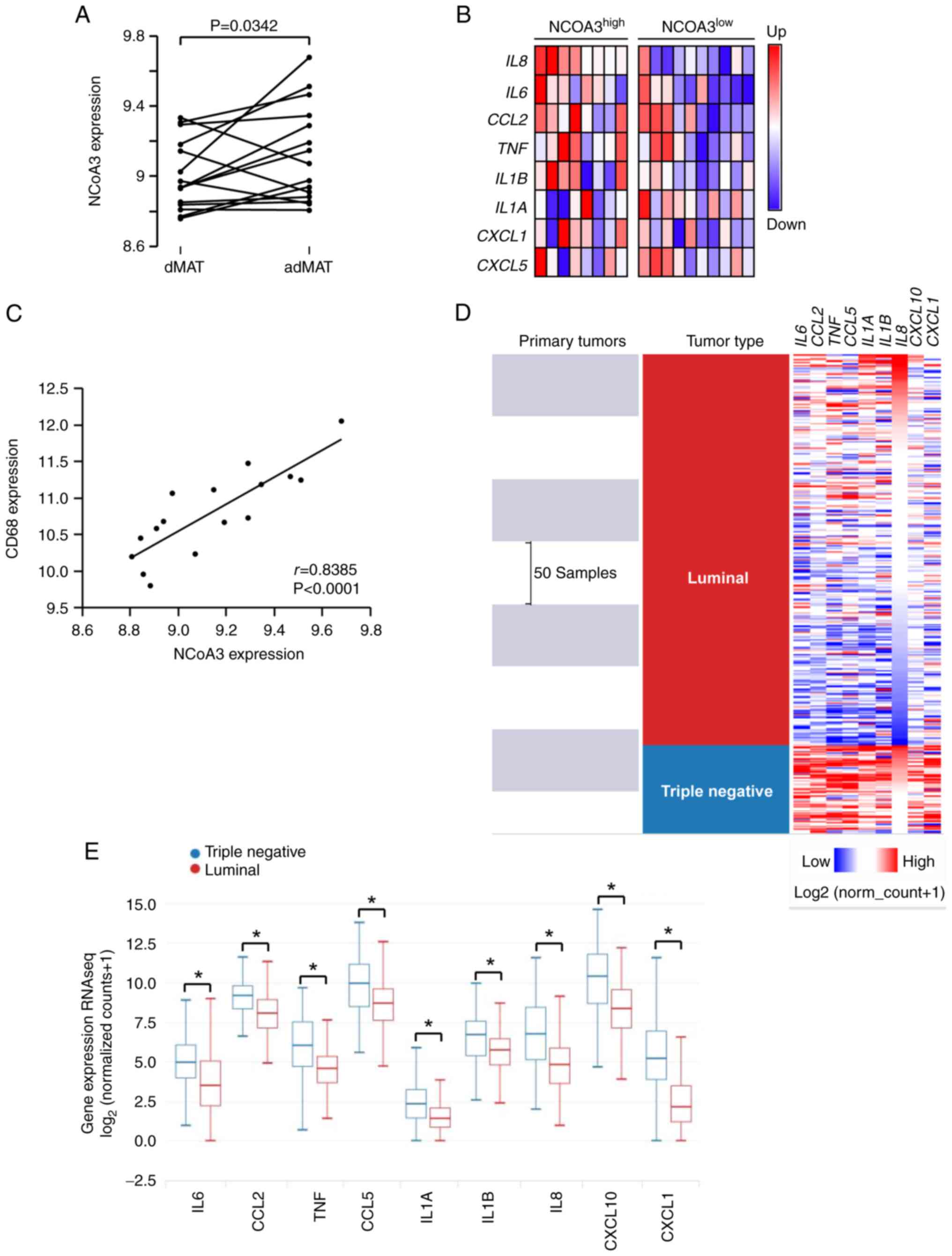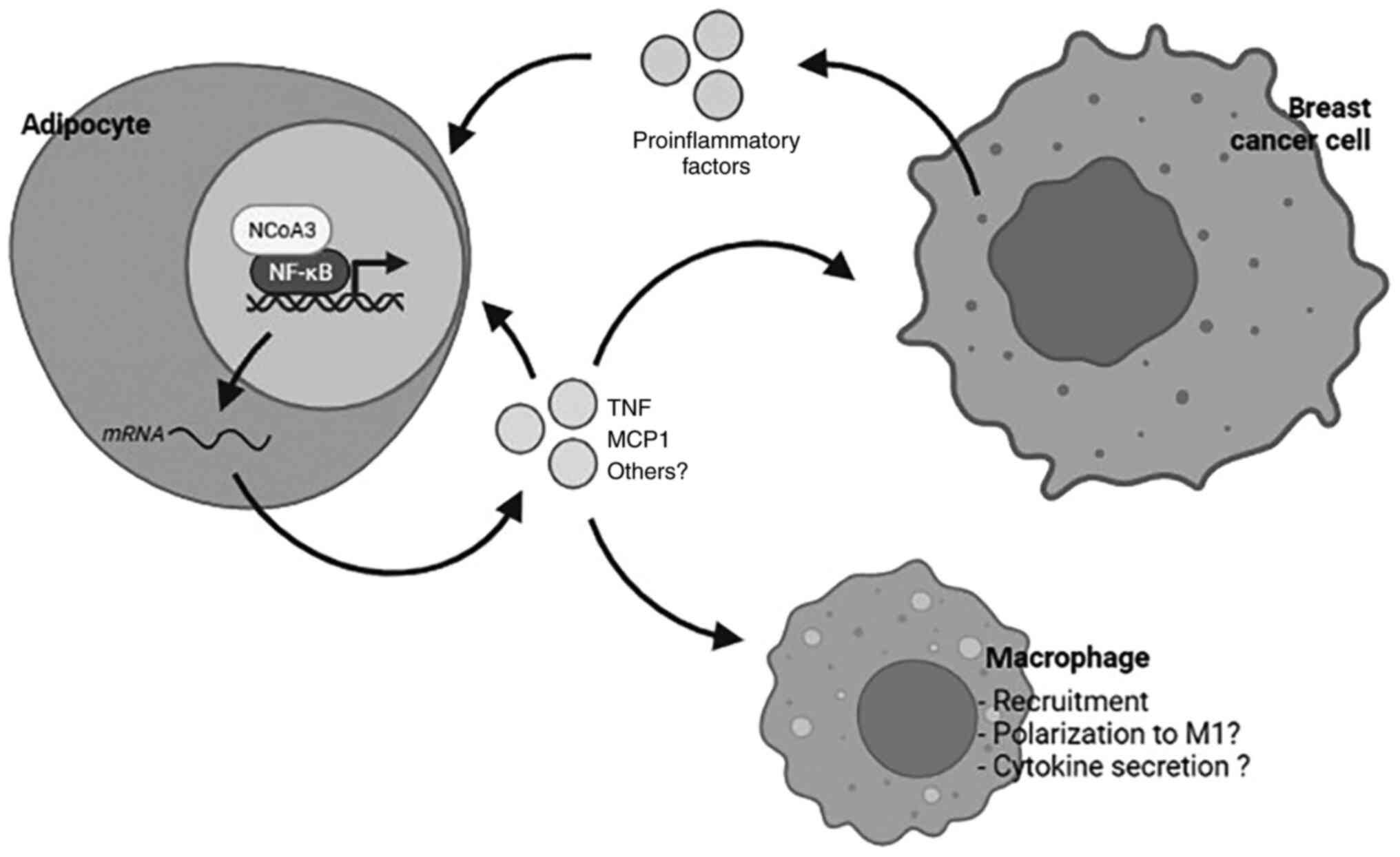|
1
|
Hajer GR, van Haeften TW and Visseren FL:
Adipose tissue dysfunction in obesity, diabetes, and vascular
diseases. Eur Heart J. 29:2959–2971. 2008. View Article : Google Scholar : PubMed/NCBI
|
|
2
|
Nieman KM, Romero IL, Van Houten B and
Lengyel E: Adipose tissue and adipocytes support tumorigenesis and
metastasis. Biochim Biophys Acta. 1831:1533–1541. 2013. View Article : Google Scholar : PubMed/NCBI
|
|
3
|
Bochet L, Meulle A, Imbert S, Salles B,
Valet P and Muller C: Cancer-associated adipocytes promotes breast
tumor radioresistance. Biochem Biophys Res Commun. 411:102–106.
2011. View Article : Google Scholar : PubMed/NCBI
|
|
4
|
Hanahan D and Weinberg RA: Hallmarks of
cancer: The next generation. Cell. 144:646–674. 2011. View Article : Google Scholar : PubMed/NCBI
|
|
5
|
Berstein LM, Kovalevskij AY, Poroshina TE,
Kotov AV, Kovalenko IG, Tsyrlina EV, Leenman EE, Revskoy SY,
Semiglazov VF and Pozharisski KM: Signs of
proinflammatory/genotoxic switch (adipogenotoxicosis) in mammary
fat of breast cancer patients: Role of menopausal status, estrogens
and hyperglycemia. Int J Cancer. 121:514–519. 2007. View Article : Google Scholar : PubMed/NCBI
|
|
6
|
Ghosh S and Karin M: Missing pieces in the
NF-kappaB puzzle. Cell. 109 (Suppl):S81–S96. 2002. View Article : Google Scholar : PubMed/NCBI
|
|
7
|
Alvarado CV, Rubio MF, Fernandez Larrosa
PN, Panelo LC, Azurmendi PJ, Ruiz Grecco M, Martínez-Nöel GA and
Costas MA: The levels of RAC3 expression are up regulated by TNF in
the inflammatory response. FEBS Open Bio. 4:450–457. 2014.
View Article : Google Scholar : PubMed/NCBI
|
|
8
|
Lira MC, Rosa FD, Panelo LC, Costas MA and
Rubio MF: Role of RAC3 coactivator in the adipocyte
differentiation. Cell Death Discov. 5:202018.PubMed/NCBI
|
|
9
|
Anzick SL, Kononen J, Walker RL, Azorsa
DO, Tanner MM, Guan XY, Sauter G, Kallioniemi OP, Trent JM and
Meltzer PS: AIB1, a steroid receptor coactivator amplified in
breast and ovarian cancer. Science. 277:965–968. 1997. View Article : Google Scholar : PubMed/NCBI
|
|
10
|
Liao L, Kuang SQ, Yuan Y, Gonzalez SM,
O'Malley BW and Xu J: Molecular structure and biological function
of the cancer-amplified nuclear receptor coactivator SRC-3/AIB1. J
Steroid Biochem Mol Biol. 83:3–14. 2002. View Article : Google Scholar : PubMed/NCBI
|
|
11
|
Colo GP, Rubio MF, Nojek IM, Werbajh SE,
Echeverría PC, Alvarado CV, Nahmod VE, Galigniana MD and Costas MA:
The p160 nuclear receptor co-activator RAC3 exerts an
anti-apoptotic role through a cytoplasmatic action. Oncogene.
27:2430–2444. 2008. View Article : Google Scholar : PubMed/NCBI
|
|
12
|
Fernandez Larrosa PN, Alvarado CV, Rubio
MF, Ruiz Grecco M, Micenmacher S, Martinez-Noel GA, Panelo L and
Costas MA: Nuclear receptor coactivator RAC3 inhibits autophagy.
Cancer Sci. 103:2064–2071. 2012. View Article : Google Scholar : PubMed/NCBI
|
|
13
|
Rubio MF, Werbajh S, Cafferata EG,
Quaglino A, Coló GP, Nojek IM, Kordon EC, Nahmod VE and Costas MA:
TNF-alpha enhances estrogen-induced cell proliferation of
estrogen-dependent breast tumor cells through a complex containing
nuclear factor-kappa B. Oncogene. 25:1367–1377. 2006. View Article : Google Scholar : PubMed/NCBI
|
|
14
|
Rubio MF, Lira MC, Rosa FD, Sambresqui AD,
Salazar Guemes MC and Costas MA: RAC3 influences the
chemoresistance of colon cancer cells through autophagy and
apoptosis inhibition. Cancer Cell Int. 17:1112017. View Article : Google Scholar : PubMed/NCBI
|
|
15
|
Yunokawa M, Yoshida H, Watanabe R, Noguchi
E, Shimomura A, Shimoi T, Yonemori K, Shimizu C, Fujiwara Y and
Tamura K: Allred score is a promising predictor of prognosis and
medroxyprogesterone acetate efficacy in patients with endometrial
cancer. Cancer Chemother Pharmacol. 80:127–134. 2017. View Article : Google Scholar : PubMed/NCBI
|
|
16
|
Gradishar WJ, Anderson BO, Balassanian R,
Blair SL, Burstein HJ, Cyr A, Elias AD, Farrar WB, Forero A,
Giordano SH, et al: Breast Cancer, Version 4.2017, NCCN Clinical
Practice Guidelines in Oncology. J Natl Compr Canc Netw.
16:310–320. 2018. View Article : Google Scholar : PubMed/NCBI
|
|
17
|
Fain JN, Tagele BM, Cheema P, Madan AK and
Tichansky DS: Release of 12 adipokines by adipose tissue, nonfat
cells, and fat cells from obese women. Obesity (Silver Spring).
18:890–896. 2009. View Article : Google Scholar : PubMed/NCBI
|
|
18
|
Percie du Sert N, Ahluwalia A, Alam S,
Avey MT, Baker M, Browne WJ, Clark A, Cuthill IC, Dirnagl U,
Emerson M, et al: Reporting animal research: Explanation and
elaboration for the ARRIVE guidelines 2.0. PLoS Biol.
18:e30004112020. View Article : Google Scholar : PubMed/NCBI
|
|
19
|
Ruifrok AC and Johnston DA: Quantification
of histochemical staining by color deconvolution. Anal Quant Cytol
Histol. 23:291–299. 2001.PubMed/NCBI
|
|
20
|
Fain JN, Buehrer B, Bahouth SW, Tichansky
DS and Madan AK: Comparison of messenger RNA distribution for 60
proteins in fat cells vs the nonfat cells of human omental adipose
tissue. Metabolism. 57:1005–1015. 2008. View Article : Google Scholar : PubMed/NCBI
|
|
21
|
Zhong H and Simons JW: Direct comparison
of GAPDH, beta-actin, cyclophilin, and 28S rRNA as internal
standards for quantifying RNA levels under hypoxia. Biochem Biophys
Res Commun. 259:523–526. 1999. View Article : Google Scholar : PubMed/NCBI
|
|
22
|
Livak KJ and Schmittgen TD: Analysis of
relative gene expression data using real-time quantitative PCR and
the 2(−Delta Delta C(T)) method. Methods. 25:402–408. 2001.
View Article : Google Scholar : PubMed/NCBI
|
|
23
|
Miran I, Scherer D, Ostyn P, Mazouni C,
Drusch F, Bernard M, Louvet E, Adam J, Mathieu MC, Haffa M, et al:
Adipose tissue properties in tumor-bearing breasts. Front Oncol.
10:15062020. View Article : Google Scholar : PubMed/NCBI
|
|
24
|
Ritchie ME, Phipson B, Wu D, Hu Y, Law CW,
Shi W and Smyth GK: limma powers differential expression analyses
for RNA-sequencing and microarray studies. Nucleic Acids Res.
43:e472015. View Article : Google Scholar : PubMed/NCBI
|
|
25
|
Dirat B, Bochet L, Dabek M, Daviaud D,
Dauvillier S, Majed B, Wang YY, Meulle A, Salles B, Le Gonidec S,
et al: Cancer-associated adipocytes exhibit an activated phenotype
and contribute to breast cancer invasion. Cancer Res. 71:2455–2465.
2011. View Article : Google Scholar : PubMed/NCBI
|
|
26
|
Hauner H: Secretory factors from human
adipose tissue and their functional role. Proc Nutr Soc.
64:163–169. 2005. View Article : Google Scholar : PubMed/NCBI
|
|
27
|
Iyengar P, Combs TP, Shah SJ, Gouon-Evans
V, Pollard JW, Albanese C, Flanagan L, Tenniswood MP, Guha C,
Lisanti MP, et al: Adipocyte-secreted factors synergistically
promote mammary tumorigenesis through induction of anti-apoptotic
transcriptional programs and proto-oncogene stabilization.
Oncogene. 22:6408–6423. 2003. View Article : Google Scholar : PubMed/NCBI
|
|
28
|
Zamboni M, Di Francesco V, Garbin U,
Fratta Pasini A, Mazzali G, Stranieri C, Zoico E, Fantin F, Bosello
O and Cominacini L: Adiponectin gene expression and adipocyte
NF-kappaB transcriptional activity in elderly overweight and obese
women: inter-relationships with fat distribution, hs-CRP, leptin
and insulin resistance. Int J Obes (Lond). 31:1104–1109. 2007.
View Article : Google Scholar : PubMed/NCBI
|
|
29
|
Sasaki CY, Barberi TJ, Ghosh P and Longo
DL: Phosphorylation of RelA/p65 on serine 536 defines an
I{kappa}B{alpha}-independent NF-{kappa}B pathway. J Biol Chem.
280:34538–34547. 2005. View Article : Google Scholar : PubMed/NCBI
|
|
30
|
Werbajh S, Nojek I, Lanz R and Costas MA:
RAC-3 is a NF-kappa B coactivator. FEBS Lett. 485:195–199. 2000.
View Article : Google Scholar : PubMed/NCBI
|
|
31
|
Fain JN and Madan AK: Regulation of
monocyte chemoattractant protein 1 (MCP-1) release by explants of
human visceral adipose tissue. Int J Obes (Lond). 29:1299–1307.
2005. View Article : Google Scholar : PubMed/NCBI
|
|
32
|
Choi J, Cha YJ and Koo JS: Adipocyte
biology in breast cancer: From silent bystander to active
facilitator. Prog Lipid Res. 69:11–20. 2018. View Article : Google Scholar : PubMed/NCBI
|
|
33
|
Chen K, Satlof L, Stoffels G, Kothapalli
U, Ziluck N, Lema M, Poretsky L and Avtanski D: Cytokine secretion
in breast cancer cells-MILLIPLEX assay data. Data Brief.
28:1047982020. View Article : Google Scholar : PubMed/NCBI
|
|
34
|
Luis C, Duarte F, Faria I, Jarak I,
Oliveira PF, Alves MG, Soares R and Fernandes R: Warburg Effect
Inversion: Adiposity shifts central primary metabolism in MCF-7
breast cancer cells. Life Sci. 223:38–46. 2019. View Article : Google Scholar : PubMed/NCBI
|
|
35
|
Nickel A, Blucher C, Kadri OA, Schwagarus
N, Müller S, Schaab M, Thiery J, Burkhardt R and Stadler SC:
Adipocytes induce distinct gene expression profiles in mammary
tumor cells and enhance inflammatory signaling in invasive breast
cancer cells. Sci Rep. 8:94822018. View Article : Google Scholar : PubMed/NCBI
|
|
36
|
Goldman MJ, Craft B, Hastie M, Repečka K,
McDade F, Kamath A, Banerjee A, Luo Y, Rogers D, Brooks AN, et al:
Visualizing and interpreting cancer genomics data via the Xena
platform. Nat Biotechnol. 38:675–678. 2020. View Article : Google Scholar : PubMed/NCBI
|
|
37
|
Biswas DK, Shi Q, Baily S, Strickland I,
Ghosh S, Pardee AB and Iglehart JD: NF-kappa B activation in human
breast cancer specimens and its role in cell proliferation and
apoptosis. Proc Natl Acad Sci USA. 101:10137–10142. 2004.
View Article : Google Scholar : PubMed/NCBI
|
|
38
|
Louet JF, Coste A, Amazit L, Tannour-Louet
M, Wu RC, Tsai SY, Tsai MJ, Auwerx J and O'Malley BW: Oncogenic
steroid receptor coactivator-3 is a key regulator of the white
adipogenic program. Proc Natl Acad Sci USA. 103:17868–17873. 2006.
View Article : Google Scholar : PubMed/NCBI
|
|
39
|
Wang Z, Qi C, Krones A, Woodring P, Zhu X,
Reddy JK, Evans RM, Rosenfeld MG and Hunter T: Critical roles of
the p160 transcriptional coactivators p/CIP and SRC-1 in energy
balance. Cell Metab. 3:111–122. 2006. View Article : Google Scholar : PubMed/NCBI
|
|
40
|
Torres-Arzayus MI, Font de Mora J, Yuan J,
Vazquez F, Bronson R, Rue M, Sellers WR and Brown M: High tumor
incidence and activation of the PI3K/AKT pathway in transgenic mice
define AIB1 as an oncogene. Cancer Cell. 6:263–274. 2004.
View Article : Google Scholar : PubMed/NCBI
|
|
41
|
Burandt E, Jens G, Holst F, Jänicke F,
Müller V, Quaas A, Choschzick M, Wilczak W, Terracciano L, Simon R,
et al: Prognostic relevance of AIB1 (NCoA3) amplification and
overexpression in breast cancer. Breast Cancer Res Treat.
137:745–753. 2013. View Article : Google Scholar : PubMed/NCBI
|
|
42
|
Iwase H, Omoto Y, Toyama T, Yamashita H,
Hara Y, Sugiura H and Zhang Z: Clinical significance of AIB1
expression in human breast cancer. Breast Cancer Res Treat.
80:339–345. 2003. View Article : Google Scholar : PubMed/NCBI
|
|
43
|
Lee K, Lee A, Song BJ and Kang CS:
Expression of AIB1 protein as a prognostic factor in breast cancer.
World J Surg Oncol. 9:1392011. View Article : Google Scholar : PubMed/NCBI
|
|
44
|
Weiner M, Skoog L, Fornander T,
Nordenskjold B, Sgroi DC and Stal O: Oestrogen receptor
co-activator AIB1 is a marker of tamoxifen benefit in
postmenopausal breast cancer. Ann Oncol. 24:1994–1999. 2013.
View Article : Google Scholar : PubMed/NCBI
|
|
45
|
Aka JA and Lin SX: Comparison of
functional proteomic analyses of human breast cancer cell lines
T47D and MCF7. PLoS One. 7:e315322012. View Article : Google Scholar : PubMed/NCBI
|
|
46
|
Calderon-Gonzalez KG, Valero Rustarazo ML,
Labra-Barrios ML, Bazán-Méndez CI, Tavera-Tapia A, Herrera-Aguirre
ME, Sánchez del Pino MM, Gallegos-Pérez JL, González-Márquez H,
Hernández-Hernández JM, et al: Determination of the protein
expression profiles of breast cancer cell lines by quantitative
proteomics using iTRAQ labelling and tandem mass spectrometry. J
Proteomics. 124:50–78. 2015. View Article : Google Scholar : PubMed/NCBI
|
|
47
|
Zyad A, Benard J, Tursz T, Clarke R and
Chouaib S: Resistance to TNF-alpha and adriamycin in the human
breast cancer MCF-7 cell line: Relationship to MDR1, MnSOD, and TNF
gene expression. Cancer Res. 54:825–831. 1994.PubMed/NCBI
|
|
48
|
Smith RA, Kirstein M, Fiers W and Baglioni
C: Species specificity of human and murine tumor necrosis factor. A
comparative study of tumor necrosis factor receptors. J Biol Chem.
261:14871–14874. 1986. View Article : Google Scholar : PubMed/NCBI
|
|
49
|
Iyengar NM, Morris PG, Zhou XK, Gucalp A,
Giri D, Harbus MD, Falcone DJ, Krasne MD, Vahdat LT, Subbaramaiah
K, et al: Menopause is a determinant of breast adipose
inflammation. Cancer Prev Res (Phila). 8:349–358. 2015. View Article : Google Scholar : PubMed/NCBI
|
|
50
|
Divella R, De Luca R, Abbate I, Naglieri E
and Daniele A: Obesity and cancer: the role of adipose tissue and
adipo-cytokines-induced chronic inflammation. J Cancer.
7:2346–2359. 2016. View Article : Google Scholar : PubMed/NCBI
|















